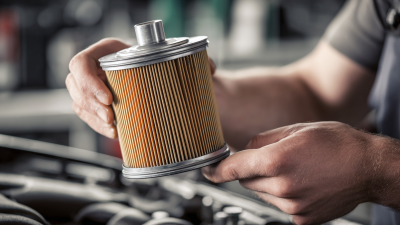Choosing the right Auto Engine Filter is crucial for maintaining vehicle performance and longevity. According to the Automotive Aftermarket Suppliers Association (AASA), approximately 80% of vehicle owners overlook the significance of replacing their engine filter regularly, which can lead to decreased fuel efficiency and potential engine damage. A proper engine filter prevents harmful contaminants from entering the engine, significantly extending its lifespan and optimizing performance. In fact, studies have shown that replacing a clogged filter can improve fuel economy by as much as 10%. As vehicles become more complex, understanding which filter best suits your specific needs is vital for both efficiency and cost-effectiveness. This blog will explore seven essential tips to help you navigate the selection process and ensure you make an informed decision on the right Auto Engine Filter for your vehicle.

When it comes to maintaining your vehicle's engine health, selecting the right auto engine filter is crucial. There are several types of filters available today, each designed to serve specific needs. The most common types include oil filters, air filters, fuel filters, and cabin filters. Oil filters are essential for removing contaminants from engine oil, ensuring that your engine runs smoothly. Conversely, air filters prevent dirt and debris from entering the engine, significantly affecting its performance and efficiency.
Fuel filters play a vital role in maintaining clean fuel delivery to your engine, while cabin filters are crucial for ensuring that the air inside your car remains free of pollutants. Each type of filter typically has a specific lifespan, and choosing the right one involves understanding your vehicle's requirements as well as the driving conditions you typically face. Regularly checking and replacing these filters can lead to improved engine performance, enhanced fuel efficiency, and a more pleasant driving experience. So when selecting an auto engine filter, consider the type that best fits your vehicle’s needs and drives conditions for optimal performance.

When selecting the right auto engine filter, it's crucial to consider the material type, as this directly impacts the filter's performance and durability. Common materials include carbon fiber, polypropylene, polyurethane, fiberglass wool, and polyamide. For instance, polyurethane filters are known for their flexibility and efficiency with both gasoline and diesel engines, making them a popular choice among consumers. On the other hand, carbon fiber filters offer enhanced strength and can cater to high-performance vehicles, appealing to those who prioritize engine protection under extreme conditions.
In 2029, the commercial vehicle auto thermal system market is projected to grow significantly, from $15.09 billion in 2022 to $20.99 billion, with a compound annual growth rate of 4.83%. This growth reflects the increasing focus on improving engine performance and operational efficiency, leading to a surge in demand for specialized filters capable of handling advanced engine technologies.
Moreover, understanding the engine cleaning services market can further aid in filter selection. The market trends indicate a preference for regular service frequencies among consumers, emphasizing the importance of maintaining optimal engine health. Regular cleaning and maintenance services can prolong the life of your auto engine filter, ensuring better performance and fuel efficiency. When choosing a filter, it's essential to assess not only the material and fuel compatibility but also the maintenance requirements to secure your vehicle's longevity.

Choosing the right engine filter is crucial for optimizing your vehicle's performance. Research shows that inadequate filtration can lead to significant reductions in fuel economy, as clogging restricts airflow into the engine. For instance, a study highlighted that the air filter's condition directly affects a vehicle's fuel efficiency, with restricted airflow potentially decreasing mileage by up to 10%. Vehicles equipped with efficient air filters show improved combustion efficiency, resulting in enhanced power output and reduced emissions.
Moreover, the impact of the air filter extends to the performance of various engine types, including diesel engines where diesel particulate filters (DPFs) help meet stringent emission regulations. Studies indicate that proper maintenance of DPFs can lead to reduced fuel consumption and lower emissions, aligning with global standards. In fact, data suggest that regular replacement of engine filters can prevent a rise in unburned hydrocarbons, thus preserving the vehicle's performance over its lifespan, and ensuring compliance with environmental norms.
When it comes to selecting the right auto engine filter, understanding the materials used is crucial for optimizing your vehicle's performance. There are three main types of filters to consider: paper, cotton, and synthetic. Each material has its unique advantages and is suited for different driving conditions and maintenance preferences.
Paper filters are commonly used due to their cost-effectiveness. They effectively trap dust and debris, providing a good balance of filtration and airflow. However, they may not be as durable as other materials.
Cotton filters, on the other hand, offer superior filtration and can be cleaned and reused, making them more environmentally friendly. This option is particularly beneficial for those who prioritize long-term savings and sustainability.
Finally, synthetic filters, made from advanced materials, can provide the highest level of filtration, making them ideal for high-performance vehicles or extreme driving conditions. Understanding these differences allows drivers to choose the best filter that aligns with their driving habits and environmental considerations, much like selecting the right air pollution mask for protection against airborne particles.
When it comes to maintaining the health and performance of your vehicle, the auto engine filter plays a critical role. Regularly checking and replacing your engine filter can significantly enhance your car's efficiency and longevity.
According to a report by the Automotive Aftermarket Industry Association (AAIA), replacing a clogged engine filter can improve fuel efficiency by up to 10%. This statistic underscores the necessity of routine checks, especially for vehicles that travel in dusty or polluted environments where filters can become clogged more quickly.
To ensure optimal performance, it's advisable to replace your engine filter every 12,000 to 15,000 miles, or as specified by your vehicle's manufacturer. Failing to do so can lead to reduced engine performance and increased wear and tear. The Car Care Council states that a well-maintained engine filter not only keeps your engine running smoothly but also helps in reducing harmful emissions by up to 50%. Therefore, keeping track of your filter replacement schedule is crucial for both vehicle upkeep and environmental health.






